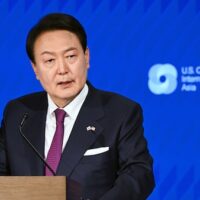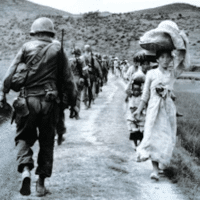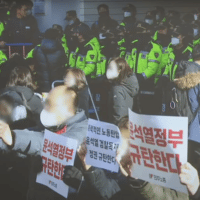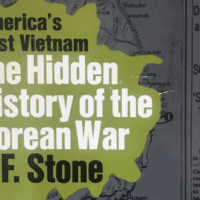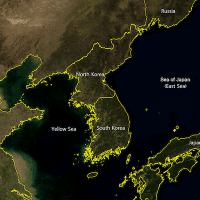-
CIA documents prove the agency was lying to public about germ warfare in Korea for decades
For years, academic historians had dismissed the allegation that the U.S. had engaged in germ warfare in Korea as communist propaganda.
-
Was South Korea’s coup an attempt to restart the Korean War?
Opposition lawmakers are alleging the full scope of President Yoon’s coup involved a months-long plot to trigger a “limited war” with North Korea.
-
Another war diary entry
Critical cultural historical perspective is not easy to obtain.
-
The republic of prosecution: South Korea’s national security state unleashes attacks on labor and peace activists
Progressive South Korean citizens have been watching with impending dread the deepening threats of political repression since the former prosecutor Yoon Suk Yeol assumed the South Korean presidency. On Wednesday, January 18, the Yoon administration took off its gloves.
-
Supreme Court orders reparations for sex workers serving U.S. Military
Reminiscent of Imperial Japan’s “Comfort Women,” the organized sex trade near U.S. bases in Korea involved horrendous human rights violations.
-
Penetrating curtains of deceit: I.F. Stone’s ‘The Hidden History of the Korean War’
When the American journalist, I.F. Stone, published The Hidden History of the Korean War at the height of the military conflict in 1952, its message did not find a warm welcome at home.
-
Seeking peace on the Korean Peninsula
Although the date drew little notice in the U.S. media, July 27, 2020 marked the 67th anniversary of the Korean War Armistice Agreement, an agreement that ended the fighting but not the war between the United States and the Democratic People’s Republic of Korea (North Korea).
-
The Imperial War Museum in London: A Lesson in State Propaganda?
In January 2016, I attended Tate Britain’s Artist and Empire: Facing Britain’s Imperial Past, a disappointing exhibition that in spite of its title did not face Britain’s past in any meaningful way. On the contrary, as I argued in my review, it shied away from this bloody history in favour of quasi-glorification, non-committal wording and […]
-
For a “Third Reconstruction”: An Interview with Bill Fletcher, Jr.
As the 2016 electoral game here ratchets up to nasty polemics, the US media is mainly focused on the carnival atmosphere of the Republican Party candidates. (The Democratic Party infighting is only now beginning to boil over.) Meanwhile, the Obama administration, free from scrutiny, continues its airstrikes in Somalia, Yemen, Afghanistan, Pakistan, Syria, Iraq, and […]
-
Bombs for Peace: A Review
George Szamuely. Bombs for Peace: NATO’s Humanitarian War on Yugoslavia. Amsterdam: Amsterdam University Press, 2013 (Distributed in the U.S. and Canada by the University of Chicago Press). Paper. Pp. 611. In Bombs for Peace, George Szamuely, a senior research fellow at the Global Policy Institute at London Metropolitan University, has produced a revealing and sharply […]
-
Anatomy of a Hatchet Job: Regarding Women Cross DMZ in CNN’s Situation Room
A television news program opens with a clip of marching soldiers, an obligatory image when the subject is North Korea. A voiceover intones: “A bold, ambitious plan apparently sanctioned by Kim Jong Un. Is he in league with the women’s group to promote peace between North and South Korea?” The program in question is the […]
-
Black Lives Matter in the Best Films of 2014
More than 100 years after the birth of cinema, it sometimes feels like every story has been told. But the best films of 2014 dared to break out of their genres, explore new ways of filmmaking, and inspire viewers. Some of them even provided tools for popular understanding of our current political moment. This year, […]
-
The “Responsible Nuclear State”: The United States and the Bomb
In light of the revelations that the United States was prepared to use nuclear weapons in the event of war between the Democratic People’s Republic of Korea (DPRK) and the Republic of Korea, it may be worth revisiting the idea that America represents a “responsible” nuclear power, in opposition to countries like Iran and […]
-
“Today Is the Day Democracy Is Murdered”: Wave of Repression Sweeps South Korea
On December 19, the South Korean Constitutional Court delivered a devastating blow against the progressive movement when it disbanded the Unified Progressive Party (UPP) with immediate effect. That act came as the culmination of a long campaign by South Korean President Park Geun-hye to shackle the labor movement and smash political opposition. The Constitutional Court […]
-
Imperialism and The Interview: The Racist Dehumanization of North Korea
The haze of political chaos in America surrounding the Ferguson protests, the Torture Report, and the “relaxing” of US-Cuba relations has been broken by a media spectacle almost too ridiculous to comprehend. A hacker group called the “Guardians of Peace” conducted a “cyber attack” on Sony Pictures Entertainment, leaking emails, documents, presentations, and information […]
-
Losing Heads and Sending Arms
Two famous heads got lost in Berlin. Neither loss, I hasten to add, was connected with brutality. From the past or near future, they caused melancholy or rejoicing, depending on your viewpoint. One loss really occurred twenty-two years ago, when the 62-foot red granite statue of Lenin on East Berlin’s Lenin Square and Lenin Allee […]
-
Unraveling Capitalist Globalization
Despite the prolonged global economic crisis since 2007/2008, neo-liberal economic thought and practice continue to reign supreme. In his important book Capitalist Globalization: Consequences, Resistance, and Alternatives (Monthly Review Press, 2013), Martin Hart-Landsberg makes a number of key interventions unraveling the myth of neo-liberalism as well as the dynamics underlying capitalist accumulation. First, he identifies […]
-
Constructing the North Korean Revolution
Suzy Kim. Everyday Life in the North Korean Revolution, 1945-1950. Ithaca: Cornell University Press. Cloth, 45.00, pp 307. With Everyday Life in the North Korean Revolution, 1945-1950, Suzy Kim has filled a major gap in the history of North Korea. In the West, it has become customary to fixate on the top leadership in historical […]
-
A Call for Justice — Free the Cuban 5: An Interview with Netfa Freeman
Netfa Freeman is a longtime activist/organizer who has worked on Cuba solidarity issues for several years. A frequent traveler to Cuba, Netfa talks about his visit last November in support of the Cuban 5. Gregory Elich: You’ve recently returned from Cuba, where you attended the Ninth International Colloquium to Free the Cuban 5. In 1998, […]
-
Challenging Harper’s Imperialist Agenda
It has become commonplace to observe that the Conservative government of Stephen Harper has been re-making the symbols and practices of the Canadian state. Canada, in this view, was once the social democratic heartland of North America. But under Harper, Canada has been transformed into a hyper-regime of neoliberal market fundamentalism. Nowhere, it is argued, […]

![[Source: samim.io]](https://mronline.org/wp-content/uploads/2025/03/Screenshot-2025-03-06-at-104112 AM-200x200.png)
